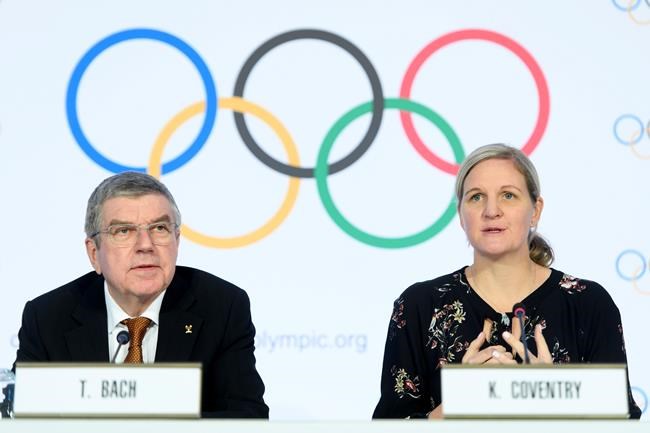IOC details rules on political protests at Olympics
Advertisement
Read this article for free:
or
Already have an account? Log in here »
To continue reading, please subscribe:
Monthly Digital Subscription
$0 for the first 4 weeks*
- Enjoy unlimited reading on winnipegfreepress.com
- Read the E-Edition, our digital replica newspaper
- Access News Break, our award-winning app
- Play interactive puzzles
*No charge for 4 weeks then price increases to the regular rate of $19.95 plus GST every four weeks. Offer available to new and qualified returning subscribers only. Cancel any time.
Monthly Digital Subscription
$4.99/week*
- Enjoy unlimited reading on winnipegfreepress.com
- Read the E-Edition, our digital replica newspaper
- Access News Break, our award-winning app
- Play interactive puzzles
*Billed as $19.95 plus GST every four weeks. Cancel any time.
To continue reading, please subscribe:
Add Free Press access to your Brandon Sun subscription for only an additional
$1 for the first 4 weeks*
*Your next subscription payment will increase by $1.00 and you will be charged $16.99 plus GST for four weeks. After four weeks, your payment will increase to $23.99 plus GST every four weeks.
Read unlimited articles for free today:
or
Already have an account? Log in here »
Hey there, time traveller!
This article was published 09/01/2020 (2186 days ago), so information in it may no longer be current.
LAUSANNE, Switzerland – No taking a knee at the Olympics. No hand gestures with political meaning. No disrespect at medal ceremonies.
The International Olympic Committee published guidelines Thursday specifying which types of athlete protests will not be allowed at the 2020 Tokyo Games.
Athletes are prohibited by the Olympic Charter’s Rule 50 from taking a political stand in the field of play — like the raised fists by American sprinters Tommie Smith and John Carlos at the 1968 Mexico City Games.

Today’s Olympians now know more about which acts of “divisive disruption” will lead to disciplinary action in Tokyo. They can still express political opinions in official media settings or on social media accounts.
“We needed clarity and they wanted clarity on the rules,” said Kirsty Coventry, chair of the IOC Athletes’ Commission, which oversaw the new three-page document. “The majority of athletes feel it is very important that we respect each other as athletes.”
Coventry, an Olympic gold medallist in swimming, is now Zimbabwe’s sports minister.
Athletes who break protest rules at the July 24-Aug. 9 Tokyo Games face three rounds of disciplinary action — by the IOC, a sport’s governing body and a national Olympic body.
The new guidelines come after two American athletes were reprimanded by the U.S. Olympic Committee for medal podium protests at the Pan-American Games in August in Lima, Peru. Fencer Race Imboden kneeled and hammer thrower Gwen Berry raised a fist in protest. Both were put on probation for 12 months, a period that covers the Tokyo Olympics.
Other protests in 2019 included swimmers from Australia and Britain refusing to join world championship gold medallist Sun Yang on the podium because the Chinese star has been implicated in doping violations.
A political gesture at the 2016 Rio de Janeiro Olympics went unpunished in the men’s marathon. Silver medallist Feyisa Lilesa crossed his wrists at the finish line to show support with freedom-seeking protesters in his home region of Ethiopia.
“It is a fundamental principle that sport is neutral and must be separate from political, religious or any other type of interference,” the IOC document states, urging “the focus for the field of play and related ceremonies must be on celebrating athletes’ performance.”
A meeting Thursday between the IOC executive board and athletes’ panel also discussed the charter’s Rule 40, which strictly limits an athletes ability to promote their sponsors during official Olympic Games periods.
German athletes working outside the IOC system won concessions last year in a ruling that has led to Olympic bodies in the United States, Australia and Canada to offer a better deal to their athletes.
In the German case, a federal cartel agency sided against the IOC’s argument that retaining exclusive rights for its top-tier sponsors protected the value of deals that help fund sports and athletes globally. Still, Coventry said the IOC panel had “an open door policy” and welcomed approaches from independent athlete groups who wanted to challenge the system.
Separately, IOC President Thomas Bach declined to comment on the whereabouts of a historic Olympic document that sold for $8.8 million at auction in New York a month ago. The IOC is expected to try to ensure it is displayed at the Olympic Museum in Lausanne.
“At this moment at least we have not enough solid information which we could share,” Bach said at a news conference.
The 14-page document is the 1892 manifesto written by French aristocrat Pierre de Coubertin to launch the modern Olympics.
___
More AP sports: https://apnews.com/apf-sports and https://twitter.com/AP_Sports











